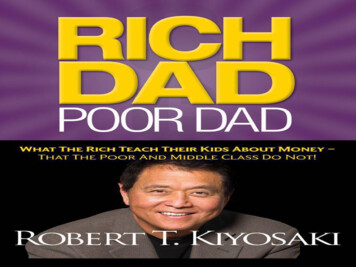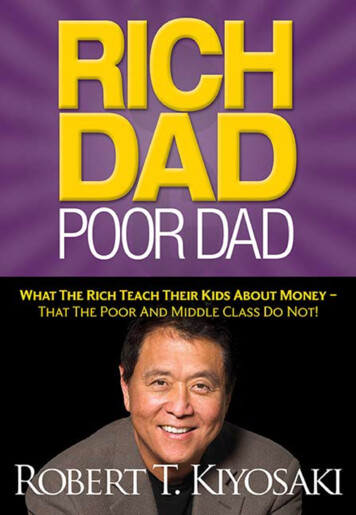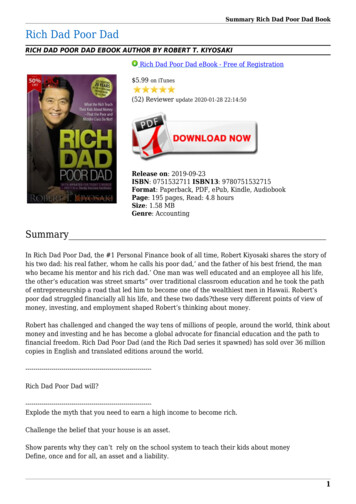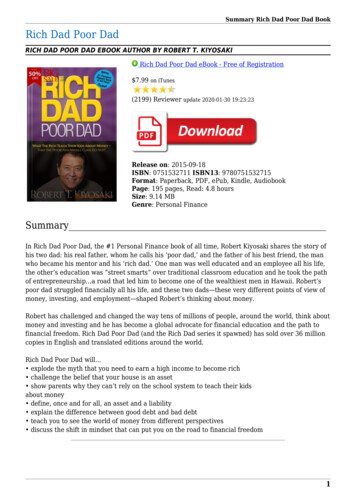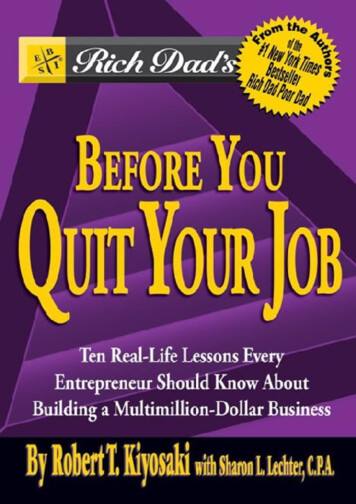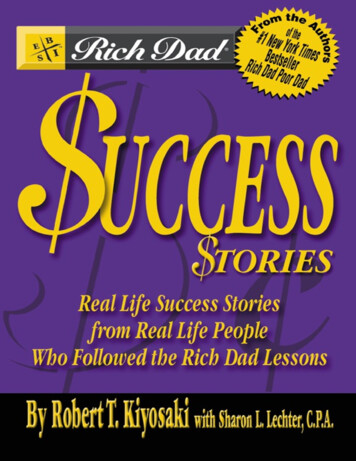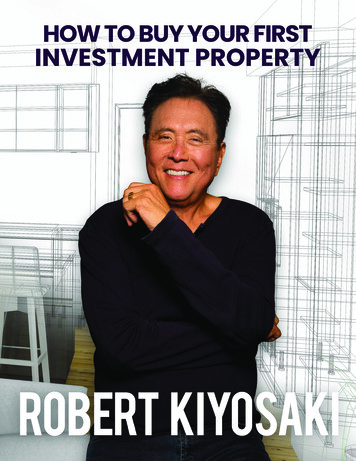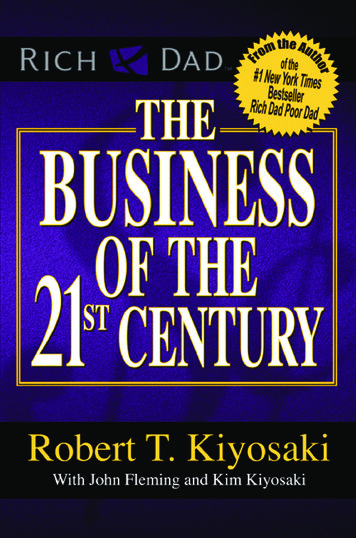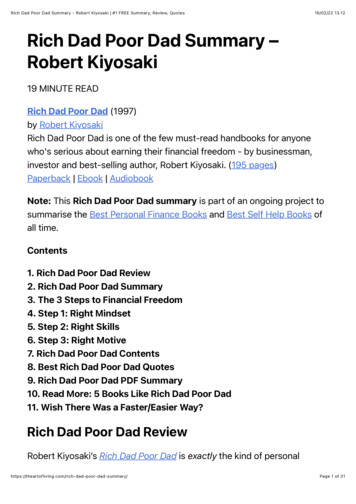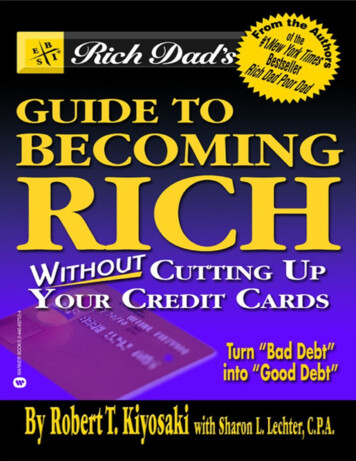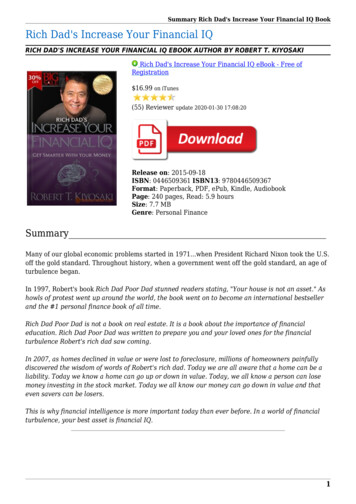
Transcription
2
IntroductionA Quick Note from RobertThroughout history, cultures have tightly grasped their dearly held beliefsso commonly accepted, so religiously observed, that to question them issacrilege. They are so sacred that to call these beliefs scams is to doomoneself to isolation and abuse. When it comes to money, these scams havetoppled every past fiat government in history.Our culture is no different. Our beliefs are no less sacred. The beliefs andscams are so sacred and hold so much power that when they are wrong theirdamage is immense. These scams assisted in the crisis of 2007.When the global financial crisis began in 2007, many people clung evenmore tightly to their sacred beliefs and their jobs in the hope of not being oneof those who were laid off. Millions held on tightly to their homes, even thoughthey could not pay the mortgage. Most cut back on their spending and savedmore, even though the federal government was printing trillions of dollars,destroying the purchasing power of their savings. Workers stuffed even moremoney into their retirement plans, even though the stock market had crashed,wiping out their prior gains. And school enrollments boomed, as more peopleheaded back to school, even though unemployment was soaring. The faith inthe scams held strong. What else could people do?The crisis did not have the effect of causing people to question the causesand the beliefs that created the crisis. Instead people clung the lies, their joband the system wide scams that created the problem. Rather than let go,most people clench their fists tighter and wait for the crisis to pass, prayingthat their political leaders can solve this global crisis and that happy dayswill return.The problem is that the coming decade, the years from 2010 to 2020,will prove to be the most volatile world-changing decade in world history.Unfortunately, the people clinging to the relics of the past— relics such asjob security, savings, a home, and a retirement plan— will be those who aremost ravaged by the global financial storm approaching.3
A few know they must make changes. Yet without a strong financialeducation, they do not know what to do or how to change.Rich Dad’s vision has always been to provide comprehensive financialeducation with quality, free resources when possible to as many people aswe can. The mission of Rich Dad Scams is to take you from the establishedmindset about money to the enlightened mindset, to put a bullet to the head ofbad financial advice, and to help you take charge of your financial future.I hope you enjoy the following. Please share it with your friends, family,and co-workers—anyone you know who could benefit from the collectiveknowledge of the Rich Dad team.Comprehensive financial education is still the surest way to financialfreedom, both personally and as a society. Together we can make adifference.Rich Dad Scam #1: Higher EducationThe “school success” scamWhen I was young, my poor dad always told me the best path to successwas to go to school. He felt that was the best way to get a good job. Theproblem was that my poor dad was one of the most educated people I knew,but he was always complaining about money and how unhappy he was withhis work.4
My rich dad, on the other hand, didn’t have a college degree. Yet hewas very rich and successful. Rich dad said, “School teaches you to be anemployee. If you want to be rich, don’t count on school.”So, from a very young age, I learned that the promise of higher educationfor success was one of the biggest scams around. That’s why the first RichDad Scam identified is higher education.Going to school doesn’t make you financially smartBecause I’m outspoken against the school system, I’m often accusedof being anti-education. Nothing could be further from the truth. But “go tocollege” is one of those things people point at as a way of being successfulwithout ever stopping to think if it’s true.The Rich Dad Scam that school will make you a success is perpetratedeverywhere and all the time. What will make you successful is not going toschool but rather financial education—learning how money works and howto make it work for you—is what will make you successful, and, unfortunately,you can’t get that in school.When it comes to money, going to school won’t make you smart.Understanding valueThis doesn’t mean that education isn’t important. The basic educationyou get in your K-12 years is important to everything that comes after. And ifyou want to be a teacher, a lawyer, or a doctor, then obviously you’re going toneed to go to college.But what you won’t learn in school is how money works. Education,particularly in America, doesn’t teach students how to live or be self-sufficient.Instead, it teaches us to be employees instead of our own bosses. It makes usworkers instead of innovators. That’s a big reason why we call school a RichDad Scam. In fact, the rich use school to keep poor people poor.Different types of intelligenceOne of the worst things about school is that it recognizes only one typeof intelligence—book smarts. If you aren’t book smart, you are very quickly5
labeled smart or stupid. As a child, I was not book smart, and I was labeledstupid. But I wasn’t stupid. I was just interested in different things. And I wasbored. For instance, no one could tell me when I’d ever use calculus in my reallife! Yet, I was told to comply and learn. I was being trained to be an employee.My rich dad wasn’t book smart either. Yet, he was very smart. He hadstreet smarts, which he used to become very rich. School doesn’t teach youto be street smart. I had to learn that from my rich dad. My poor dad thoughtschool was incredibly important, and he was very book smart. But what did itget him? He struggled financially most of his life.That’s another reason why we label higher education a Rich Dad Scam.The so-called experts tell you that you need it. They tell you it’s important.But it doesn’t actually do anything for you except make you a good employee.“But I studied money in college!”Tom Wheelwright, my Rich Dad Advisor on taxes, went to school to bean accountant and got straight A’s. He will also gladly tell you that he got nopractical financial education. He learned what was needed to do a job but nothow to successfully manage his own finances. And he went to school to learnabout money!People often say they learned about money in school. You may learn howto balance a checkbook in school, but you won’t learn how money reallyworks. That’s not an accident; it’s a scam.The rich use school to train us to be good employees. We start out beingtold what to do, and are rewarded for compliance. It’s very easy to transitionfrom a school to a company where you’re told what to do. And that leads us totrust and hand things off to the government and the rich bankers who handleour 401(k). The rich use education to make themselves richer and keep youpoor, and when you realize that, it’s not hard to see why it’s one of our RichDad Scams.Think for yourselfThe people who fall for scams are typically those who are conditionednot to think for themselves. Unfortunately, Rich Dad Scam #1, Higher
Education, robs us of the independence to think for ourselves, to think likean entrepreneur, an innovator, and an investor. It instead teaches us to bedependent.You need to learn to speak the language of money to be successful.That takes financial education, which opens up a whole new world, a worldwhere you can succeed on your own terms. Unfortunately, our schools don’tteach that language. They teach you the basics, and then they either teachyou a specific trade or skill, or they simply train you to be an employee.Today, it’s time to start thinking for yourself. Don’t fall for this the scam ofhigher education. Instead, start your financial education today, and begin yourjourney to financial freedom.Rich Dad Scam #2: Get a JobWe see scams every day. Sometimes they are easy to see and call out,like spam emails that promise riches in exchange for your bank information.But some scams are a lot harder to spot. From my rich dad, I learned financialsmarts, which taught me how to spot scams—and how to not be taken in.Unfortunately, without those financial smarts, it can be very easy to be takenin by scams, especially the scams that the rich use to keep the poor intheir place.To break away from those scams you usually need someone else to warnyou that you’re being duped, to tell you that you’re being taken advantage of,and to tell you what you can do about it.7
The big one: You need a jobWhen I was young, my poor dad always told me that I needed to go toschool so that I could get a good job. To my poor dad, getting a good jobwas the most important thing in life. My poor dad worked very hard. And hewas always worried about money. Yet, he never got ahead. His job was one ofthe things that actually kept him from succeeding. He toiled away working forothers, often getting raises only to keep up with the cost of living and paying ahigh percentage to the government in taxes.My rich dad, on the other hand, never had a “real” job, and he was richand successful. My rich dad understood that the sentiment, “Get a job,” wasa scam. Rather than get a job, he made jobs. Rather than work for someoneelse, he worked for himself. Rather than pay high taxes, he used the tax codeto get rich.How the scam worksThe reason Get a Job is a Rich Dad Scam is because it makes you poorer,especially if you have a high paying job, because you pay the most in taxes.And guess who isn’t paying a lot of taxes? The owner of the business youwork for. The scam gets even worse when you look at it long-term. If you dowell at your job, if you claw your way up the ladder, what is your reward? Asmall increase in pay and a bigger increase in taxes.It gets even worse if you work for yourself. You pay the highest taxes in theform of self-employment taxes.The only way to avoid this is to be the owner of a big business or to be aninvestor, to put your money to work for you. That’s where the rich work andlive. The system is set up to benefit the rich so they can keep their moneywhile making sure you keep getting taxed.The tax scamWhen you realize that taxes are a way of keeping you in your place, youcan see that this Rich Dad Scam is really just an extension of Rich Dad Scam#1, “Go to School.” It’s in school that you learn to be a good employee, that if8
you work hard you can succeed. But really, you can’t, not on those terms.The government gives tax breaks to those people they identify as creatingjobs: entrepreneurs and big business owners. They want the private sector todevelop real estate, start companies, and generate wealth. The governmentrewards that. In return, the government expects employees to pay taxes thatcover things like Medicare and Social Security.Some people argue that employers pay these taxes too, but really whatthey are doing is using money that would otherwise pay you to pay their shareof the taxes.False securityThe idea that a job is an important part of your personal security is a bigpart of the Rich Dad Scam #2, “Get a Job”. The reality is that having a jobdoes not make you secure. You only need to look at the state of our economyor turn on the news to see that people are losing their jobs. In an economywhere people are losing their jobs, the more secure position is to own thecompany that is firing people.Stepping awayMy poor dad, just like most people, was conditioned and taught fromthe day he was born to be an employee. My rich dad broke away from thatthinking and was an entrepreneur. He put his money to work. He was onthe side of the rich, the side protected by the government. But how do youget there?The first answer is simple. You do it by increasing your financial educationand beginning to think like an entrepreneur instead of an employee. Whenyou do that, you break out of the rat race. You realize that everything you’vebeen taught about getting a job and finding success is a lie, and that there isanother way— a better way that actually works. And that’s the secret the richdon’t want you to know.9
Rich Dad Scam #3: Work HardPeople often talk about a scam as a con. Con is short for confidence.A con man can only dupe you if you put your confidence in him. When I talkabout Rich Dad Scams, the scams designed by the rich to keep you poor,one of the hardest things to get past is that so many of us have been taughtto believe with conviction and confidence that these scams are true. And theconning started so young that we never had a chance to think differently.That’s the difference between thinking like my poor dad, who did whathe was told and died poor, and thinking like my rich dad, who was financiallyeducated and grew rich based on his knowledge of how money worked.This chapter is about one of the biggest, most-ingrained Rich Dad Scams:If you work hard, you will be rewarded.Don’t work hardMy poor dad worked hard all his life. He went to school because he wastold to. He got a job because he was taught that was what you have to do. Heworked hard because that was what he was supposed to do. Yet, he struggledfinancially his whole life, and often he was not happy.When it came to working hard, my rich dad liked a story from MarkTwain’s The Adventures of Tom Sawyer. Tom runs a con job on the kids in hisneighborhood. His job is to paint a fence, and he makes it look like so muchfun that all the other kids offer to pay him to do the work.Rich dad said, “Rather than work hard, I work smart. Smart work is gettingothers to not only do but also want to do hard work for you. And smart work isalso getting money to work for you, not the other way around”10
Why hard work doesn’t workIt seems like a simple math equation: effort reward. You work hard, youearn more, you get more for your effort, and it seems like it should work.Once upon a time, it may have worked that way.But now, there are two problems. One, as I wrote about in Rich Dad Scam#2, “Get a Job”, if you’re an employee, working harder may get you moremoney but it also means you’ll be taxed more. So working harder can actuallyresult in you being punished financially. That’s why we created the Rich DadScams series, so that you can see them for the lies they are.The second problem is that you’re working hard for something in particular:Money. And that money is worth less and less every day.During the 21st century, average income after inflation has fallen. Andcontinues to fall. If you’ve been working hard at your job for ten years, themoney you’re making now is actually worth less than it was when you earnedit. Practically speaking, that probably means you’re either making the sameamount now as a few years ago, or maybe even making less! Rather thanwork hard for money, you should be working smart by having money workhard for you. That is what the rich do.Working differentlyEvery week most people just hold on until Friday because they hate theirjob. And when Sunday rolls around, they’re miserable because they know theyhave five days of work to look forward to.It’s a lousy way to live, but it’s not the only way. We’ve just been trained tothink it’s the only way.I love my work, but I’m also never far from it. Like most entrepreneurs, I’mat it almost 24/7, but it doesn’t make me miserable—and it certainly doesn’tfeel like work. It’s more like a game that I love to play. It’s challenging. It’s fun.It’s rewarding. If that sounds attractive to you, the first step to get there isrecognizing “work hard” for the Rich Dad Scam that it is. Stop working hardfor others and start working smart for yourself.11
Rich Dad Scam #4: Live Below Your MeansRich Dad Scams, are scams that I’ve identified that the rich perpetrate onthe poor and middle class to keep them poor.One of the most challenging things about these scams is how ingrainedthey are. If you weren’t lucky enough to have a rich dad to teach you aboutthem like I did, these scams probably make up your ideas and attitudestoward money. They feel built in. Most people believe they must be truebecause they’ve heard them all their life.So it can be difficult to remember that the Rich Dad Scams I’ve identifiedare lies, but it’s vital to know that they are. And this post is going to handleone of the big ones. This scam says: In order to be rich, you have to live belowyour means.On the surface, “Live below you means,” seems to make sense, but theonly people who live below their means are poor people. The rich don’t livebelow their means. Rather, they make better means.A poor mindsetMy poor dad said, “We can’t afford that.”My rich dad said, “Rather than live below my means, I make more moneyto get what I want. Rather than say, ‘I can’t afford that,’ I ask, ‘How can Iafford that?’”“Live below your means,” is a poor mindset because it teaches you to thinktoo narrowly. Rather than teach you to be creative in making more money, it12
teaches you to be merciless in what you spend your money on. You balancethe dollars you bring in from your job against your needs and wants. And noone likes finding things you can live without so you can afford something else.It’s awful.When my wife and I want to splurge on something, we don’t look at whereto cut costs to afford it, we acquire an asset to offset the cost of what wewant. So, instead of always looking for what we can cut to afford something,we’re always looking to expand our wealth to cover the cost of what we want.It’s a completely different mindset, and it’s the way my rich dad taught meto think.For instance, some years ago I wanted to get a new Bentley. I could haveeasily paid cash for the car, but I didn’t want to do that for a liability. Instead,I invested in assets that would provide enough cash flow to cover my new toy.I took a little longer, but six months later my investments were creating enoughcash flow to pay for my car—and some. In the process, I got my fun car andalso built my wealth.This is the core of thinking like rich dad instead of poor dad. Think like aninvestor or an entrepreneur. Identify what you want and work out a plan toget there in a smart way through assets. If you live within your means, youcan never add assets, so you’ll never break the chain of cutting costs andbudgeting to afford something.Change your thinkingIf you want to think like rich dad instead of poor dad, begin asking, “Howcan I afford that?” rather than saying, “I can’t afford that.” In the process you’llgo from a poor mindset to a rich one—and you’ll also break out of the patternset by Rich Dad Scam #4, “Live Below Your Means.”13
Rich Dad Scam #5: Save MoneyThe Rich Dad Scams I’ve identified are, very simply, the things you aretaught about money that are wrong. They keep you from becoming rich.They are the ideas the rich have built into society to keep you poor and themrich. Unfortunately, they’re so driven into our minds that it can be hard torecognize them as lies.This chapter’s scam is Rich Dad Scam #5, “Save Money.”Time and money changes“If you save money, you will have money.” “Save money for a rainy day.”“A penny saved is a penny earned.” These are common lessons parents teachtheir kids about money. Unfortunately, there’s one big problem with them:they’re lies.The big problem with Rich Dad Scam #5, “Save Money,” is that it used tobe true. A generation or two ago, saving money paid off. You could set asidea certain amount of money and retire on it. Your parents or your grandparentsmight have done just that, and it worked. But what worked for them cannotwork for you in today’s economy. To understand this, you must understand thehistory of money.In 1971, Richard Nixon took the United States off the gold standard, thesystem where every dollar in the US economy was based on a dollar’s worthof gold that the country owned. When Nixon did this, it destabilized theeconomy and kick-started inflation and a number of other factors that affectthe power of your dollar. Before 1971, money was money, backed by the value14
of gold. If you saved 10 percent of your income every year, it could turn intoenough to retire on. After 1971, money became a currency that could go upand down in value with nothing of value backing other than the good faith andcredit of the United States. That is why there have been so many fluctuations,peaks and valleys, in the economy.Real moneyMoney is something that holds its value, which is a different conceptfrom currency, which is a representation of that value. When the US wentoff the gold standard, US dollars really stopped being money and becamea currency. Money is something that keeps its value. Currency fluctuates invalue, and the US dollar has kept losing value since 1971.Today, savers are losers. Why? The bank pays you a lower interest rate onyour savings than the inflation rate. In essence, this means that your money inthe bank loses more value than it gains over time. It’s a losing proposition tosave. The dollar you save today will be worth less a year from now.If, however, like an entrepreneur or an investor, you put that dollar to workfor you, then you have a chance of a return that is much higher than inflation.You have an opportunity to make money instead of losing it.Currency collapsesHistorically, once money isn’t based on something concrete, like gold, itsdays are numbered. Once your money is simply a piece of paper that reallyonly represents debt, a currency, how can it sustain itself? It can’t.My team and I are all big believers in diversifying into gold and silver, realconcrete representations of money, not currency. Precious metals have beenthe true measures of wealth for thousands of years. If we learn from history,we see that currencies collapse. Gold is consistent. It is truly money.Making your money workSo, if you can’t put your money in the bank, what can you do? The answeris to get aggressive. Putting money in the bank is passive. Putting your money15
out in the world is putting it to work. Why put your money in the bank whereit will lose value when you can put it to work for you in assets where you canturn your money into more money? That sounds like a better idea to me.Rather than believing the Rich Dad Scam #5, “Save money,” I encourage youto instead invest your money in cash-flowing assets. That is the true pathto wealth.Rich Dad Scam #6: Your House is an AssetIt seems like every financial “expert” says, “Your house is your biggestasset.” When I wrote Rich Dad Poor Dad, I said that your house was a liability.That was like spraying water on a hornets’ nest. The so-called expertslambasted me. At the time, the real estate market was skyrocketing. Everyonecalled me a contrarian, out to sell books. Today, after one of the worst housingcrashes in US history, they aren’t laughing anymore.This chapter is about one of the biggest Rich Dad Scams of all, “Yourhouse is an asset.”Money in, money outYour financial planner, real estate agent, and accountant all call your housean asset. But in reality, an asset is only something that puts money in yourpocket. If you have a house that you rent out to tenants, then it’s an asset.If you have a house, paid for or not, that you live in, then it can’t be an asset.16
Instead of putting money in your pocket, it takes money out of your pocket.That is the simple definition of a liability.This is doubly true if you don’t own your home yet. Then it’s the bank’sasset, and it is working for them, but it’s not earning you anything.So what is an asset?In business terms, assets are your pros and liabilities are your cons.You need assets to offset your liabilities. Once you get away from the RichDad Scams, it’s easier to think in those terms, to think like an entrepreneur.But what exactly are assets?The simple definition of an asset is something that puts money in yourpocket. This is accomplished through four different categories, one of whichis real estate. When I say real estate, I don’t mean your personal residence,which is a liability. What I mean is investment real estate, which is a greatinvestment because it puts money in your pocket each month in the formof rent.There are three other primary assets: business, paper, and commodities.If you are an entrepreneur or a business owner, your business is an asset.Paper assets are stocks, bonds, mutual funds, and so on. Finally, commoditiesinclude gold, and other resources like oil and gas, and so on.My wife and I started out making our money in real estate, putting ourmoney to work in properties that we could rent them out and see ongoingreturns. After that, we diversified, so now we have some money in all of four ofthese asset areas.Invest for cash flow, not appreciationThe Rich Dad Scam that your home is an asset was prevalent when I firstwrote Rich Dad Poor Dad. That was in 1997, and everyone’s home valueswere climbing. It was easy to assume that your house was an asset becauseit was potentially making money for you in the long run through appreciation.17
People bought into the scam hook, line, and sinker, taking out home equityloans to buy cars, vacations, TV’s, and more. Today, those same people areso underwater that many of them are defaulting and going into foreclosure.Most people aren’t saying their home is an asset any longer.A lot of Americans got a fast, ugly financial education when the real estatemarket turned around. They realized very quickly that their homes werenot assets.The difference between my poor dad and my rich dad was a financialeducation. And that’s not a classroom and books education, that’s a nuts-and-bolts, street-smart education, a way of looking at money that is true andthat works, not just what the rich want you to believe.Rather than invest for appreciation, my rich dad taught me to invest forcash flow and to treat appreciation like icing on a cake. I encourage you to dothe same.Rich Dad Scam #7: Get Out Of DebtAs you’ve been reading this ebook, you may see some patterns in RichDad Scams. Several of them go together, and they all come from the samemindset. Saving money, living below your means, and this Rich Dad Scam,“Getting Out of Debt,” all come from one place: Being afraid of money.Just like all the other scams, the idea that you have to get out of debt andstay out of debt to be successful is a lie, and it gets repeated because peopledon’t have a financial education. They simply don’t really understand whatmoney is, how it works, and how to put it to work.18
Isn’t debt bad?The Rich Dad Scams we identify are the ways the rich stay rich and makesure the poor stay poor. That can be counterintuitive, especially when someof the scams, like getting out of debt and saving money, seem like they wouldhelp you get rich. But that’s the scam.The rich carry debt. They generally carry a lot of debt. But they have assetsthat more than make up for the debt the carry. In fact, the rich not only carrydebt, they also use it to get richer. The difference between the rich and poorwhen it comes to debt is understanding the difference between good debtand bad debt.Good debt versus badBad debt is debt that makes you poorer, such as credit card debt, carloans, and more. This is the type of debt used to buy liabilities.Good debt is debt that makes you richer, such as a loan for investmentproperty or to purchase equipment for your business that will make you areturn. This is the type of debt that is used to buy assets.An easy example of good debt is my real estate holdings. By getting a loanfrom the bank, I can purchase a property with only a small percentage out ofmy pocket. I then rent that property and my tenant pays the cost of the debtwhile putting money in my pocket.Business is the same as the real estate example. You have good debt thatpays for itself. The cash flow of your business covers the debt and generatesincome. That income can be turned into more good debt to create morecash flow.We’ve been taught to think of debt as a four-letter word, but it doesn’t haveto be. Especially once you have the financial education to see how it can workfor you instead of against you.How money works for youI have an excellent example of how the good debt concept works. Say Ihave 100,000. Maybe I inherited it, or sold something valuable. But I have this19
money. I can put it into a mutual fund, which is a little better than saving it.The return on it would be a bit more than just putting it in savings, but it won’tbe a lot.However, if I use that 100,000 as a down payment on a 500,000property, then I’ve actually bought 500,000 in value with just 100,000! Thedifference, that 400,000, is good debt.This is exactly what my wife Kim did on a smaller scale with her firstinvestment. She bought a 45,000 house with a 5,000 down payment,acquiring 40,000 in good debt, and she put that property to work.The tenants paid the mortgage and the taxes on it for her. She was profiting,or generating a positive cash flow of 25 a month. It wasn’t a lot, but it was astart. She used the same practice over and over again, and she kept puttingthat money to work. Today, she invests in millions, but the concept isthe same.Today, rather than buy into the lie of Rich Dad Scam #7, “Get Out of Debt,”I encourage you to instead increase your education and begin learning howyou can make good debt work for you.Rich Dad Scam #8: Invest Diversely in the Long TermRich Dad Scams are the “rules” the rich want you to follow that will keepyou an employee and keep you from getting rich while they get richer.The reason why so many people buy into these scams is because some of20
them, like working harder and saving money, used to be viable. If you followedthem, there was a reward, but not anymore.As we’ve seen in other scams like paying off debt, living within your means,and saving your money, the Rich Dad Scams I’ve identified keep you fromtruly putting your money to work. They keep you from turning your money intomore money. In other words, they keep you poor.Let’s take a loo
knowledge of the Rich Dad team. Comprehensive financial education is still the surest way to financial freedom, both personally and as a society. Together we can make a difference. Rich Dad Scam #1: Higher Education The "school success" scam When I was young, my poor dad always told me the best path to success was to go to school.

